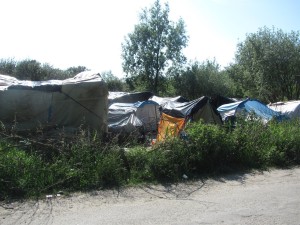Calais Refugee Camp Closed in Northern France
French police continue to demolish a large migrant camp in Calais, a process they began February 29, despite protests from refugees and external organizations. The camp is known as “The Jungle” for its large population and poor conditions. The closure of the camp has given way to disorder and chaos as French officials attempt to deal with large numbers of displaced people hoping to reach the United Kingdom.
Calais has been a stopping point for refugees fleeing the Middle East and Africa since 2009, largely because of its proximity to the English Channel. According to BBC News, many migrants in northern France have attempted to flee to Britain by hiding on commercial ferries and large trucks.

On March 8, The Telegraph released a report from British Home Office officials stating that 3,600 migrants were prevented from entering the UK throughout the summer of 2015 while over 1,000 secretly made it past border security. Numbers for 2016 are currently unknown due to the increasingly large numbers of refugees and the secrecy associated with sneaking into the country.
In response to the influx of hopefuls arriving at Britain’s doorstep, the United Kingdom and France have implemented new measures to keep migrants out. As part of this new strategy, a court in Lille approved plans to raze parts of the Calais camp on February 25.
Throughout the first week of March, police began lighting parts of the camp on fire and spraying tear gas to force people away. French officials pushed some refugees to apply for asylum in France and attempted to deport others, though many have simply relocated to smaller camps nearby.
Euronews reported that some migrants have refused to leave “The Jungle” and remain in the camp despite facing tear gas and demolition. Some remaining refugees include seven Iranian and Iraqi migrants who sewed their lips together to protest police action. One refugee stated, “I cannot live in the Jungle anymore because CRS [French riot police] no leave me alone [sic], destroyed my shelter, and I don’t know where my life is going.”
Many human rights agencies have criticized the actions of the French and British governments. Marta Welander, founder of the UK-based Refugee Rights Data Project, told The Guardian on March 1 that eviction “is unlikely to provide a viable solution to the current humanitarian crisis on our doorstep.”
Some French officials disagree, as one told the BBC that clearing the camp was a “humanitarian operation.”
These differing opinions reveal how “The Jungle’s” closure has undeniably introduced a new level of uncertainty to the ongoing migrant crisis for both former residents of the camp and for France and Britain.
Note: An abbreviated version of this article appear in print on March 22, 2016.
